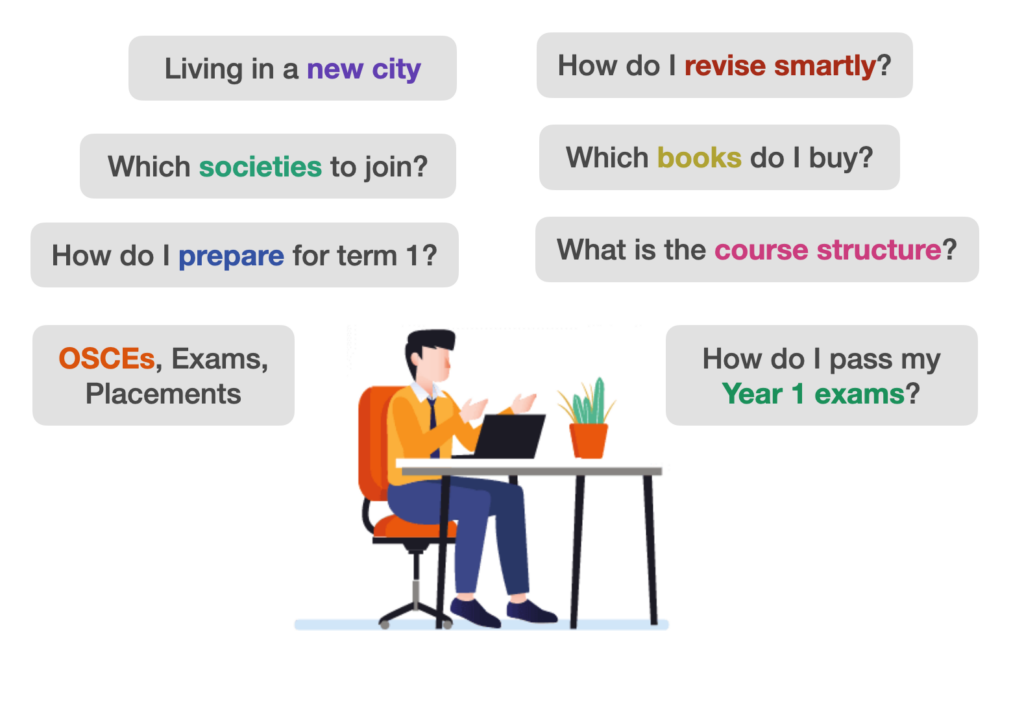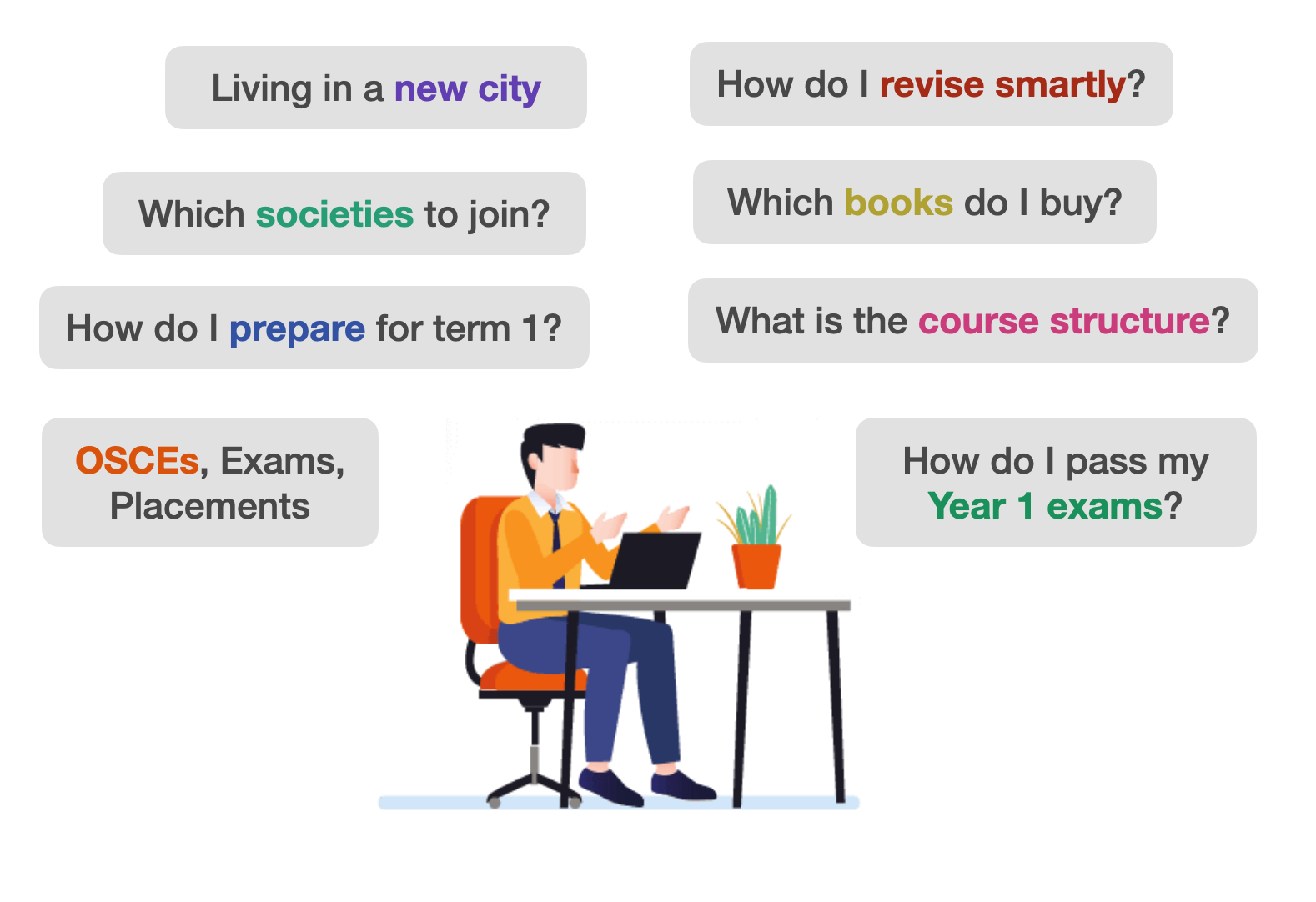Loading...

Surviving Medical School: The First Year
Congratulations! You’ve embarked on a journey that promises to be both rewarding and challenging – your first year of medical school. As you navigate the labyrinth of lectures, labs, and clinical experiences, it’s essential to equip yourself with the right strategies to not only survive but thrive. Here are our indispensable tips to help you conquer your first year of medical school.
Settling in
- Embrace Change: The transition to medical school can be overwhelming but remember that everyone starts from scratch. Embrace the changes and be open to new experiences.
- Connect with Peers: Build a network of fellow students who can provide emotional support and share tips on surviving the challenges.
- Explore Resources: Familiarise yourself with campus facilities, libraries, online resources, and academic support services available to you.
Read more tips and advice in our guide about Surviving The First Week of Medical School.
Learning New Content – Study Strategies
- Active Learning: Passive reading won’t cut it. Engage actively with the material through note-taking, summarising, and discussing with peers.
- Conceptual Understanding: Focus on understanding concepts rather than rote memorisation. This approach will make information retention and application easier.
- Chunking: Break down complex topics into smaller, manageable sections for easier comprehension and memorisation.
- Utilise Active Recall: Test yourself on the material you’ve learned rather than simply rereading notes. This strengthens your memory retention and understanding.
- Spaced Repetition: Review and revisit material at increasing intervals to reinforce long-term memory retention.
- Pre-Read Before Lectures: Skim through the upcoming lecture material to have a basic understanding, which will make the lecture itself more comprehensible and engaging.

Choosing Study Methods
- Variety is Key: Mix up your study methods – from reading and summarising to drawing diagrams or teaching concepts to others. Variety keeps your learning engaging.
- Practice with Questions: Use practice questions, quizzes, and past papers to test your understanding and prepare for exams.
Planning Your Time
- Prioritise Tasks: Create a to-do list, prioritising tasks based on deadlines and importance. This will help you manage your time more effectively.
- Time Blocking: Allocate specific time blocks for studying, attending lectures, and taking breaks to maintain a balanced routine.
- Stay Organised: Use digital tools, apps, or physical planners to keep track of assignments, exams, and important deadlines.
- Minimise Distractions: Create a focused study environment by turning off notifications, silencing your phone, and finding a quiet place to work.
Using Resources
- Choose Wisely: Don’t feel compelled to buy every recommended textbook. Prioritise based on your learning style and the depth of information you need.
- Annotate: Highlight key points, jot down your insights, and ask questions in the margins to make your textbooks more interactive and useful.
Asking for Help
- Utilise Professors: Don’t hesitate to reach out to your professors for clarification. They’re there to help you understand and succeed.
- Form Study Groups: Collaborate with peers to discuss difficult concepts, share insights, and reinforce your understanding.
- Seek Online Resources: Platforms like online forums and educational websites can provide additional explanations and alternative perspectives on challenging topics. Why not book a free consultation today with one of our advisors to see how medical school degree tutoring can help support you in your studies.

Finding Your Way
- Clinical Exposure: Take every opportunity to shadow clinicians and observe patient interactions. This hands-on experience will solidify your understanding and passion for medicine.
- Stay Curious: Approach every patient case, lecture, or experience with a curious mindset. Asking questions and seeking explanations will deepen your understanding.
- Reflect on Cases: After encounters with patients or case studies, take time to reflect on what you learned and how you can improve your approach in the future.
- Shadow Diverse Specialties: Explore a variety of medical specialties during clinical rotations to gain a broad understanding of different fields.
Maintaining Work-Life Balance
- Scheduled Breaks: Incorporate regular breaks into your study routine. Short walks, workouts, or moments of relaxation will recharge your mind.
- Social Connections: Spend quality time with friends and family to maintain a healthy social life and counterbalance the demands of medical school.
Learning from Mistakes
- Resilience: Embrace failure as a stepping stone to success. Every challenge you encounter is an opportunity to learn and grow.
Effective Communication and Professionalism
- Practice Communication Skills: Start honing your patient communication skills early on. Clear and empathetic communication is a cornerstone of being a successful doctor.
- Dress Professionally: When attending clinical placements or practical sessions, adhere to the dress code and maintain a professional appearance.
- Respect Confidentiality: Uphold patient confidentiality and privacy at all times. This is an essential aspect of medical professionalism.
Mental Health and Well-being
- Access Support Services: Most universities have counselling and well-being services. If you’re feeling overwhelmed, seek help from professionals who are trained to assist students.
- Practice Mindfulness: Incorporate mindfulness techniques into your routine to manage stress and stay focused.
- Stay Physically Active: Regular exercise can significantly improve your mood, energy levels, and overall well-being.
Exam Preparation and Test-Taking Strategies
- Mock Exams: Take advantage of mock exams provided by your school to simulate real exam conditions and assess your preparedness.
- Time Management in Exams: During exams, allocate time according to the marks allotted to each question. Don’t get stuck on a single question for too long.
- Review Feedback: After exams, review your mistakes and the feedback provided. This will help you identify areas for improvement.
Networking and Professional Development
- Attend Conferences and Seminars: Participate in medical conferences and seminars to stay updated on the latest research and network with professionals.
- Join Medical Societies: Get involved in medical student societies related to your interests. This is a great way to connect with like-minded peers and engage in extracurricular activities.
Adaptability and Resilience
- Be Adaptable: Medicine is constantly evolving. Develop a flexible mindset to embrace changes in treatment protocols, technology, and medical knowledge.
- Celebrate Small Wins: Acknowledge your achievements, whether big or small. Celebrating milestones can boost your confidence and motivation.
Starting Medical School Package

Are you feeling a little overwhelmed by the prospect of starting medical school? Our Medical School Starter package is designed to give you confidence and save you hours of stress and misdirection at medical school. Our tips covering academics, medical placements, university societies and social factors will make sure you get a head start on medical school. Through our live sessions and 1-1 mentor sessions, we will give you information on:
- How to prepare for university
We will discuss the pre-university preparation you can do, including joining societies for beginning university life, the pre-reading you should do, the way to tackle Week 1 and more
- Specific advice on the Year 1 Medical Course
We will breakdown the structure of your medical school course, identifying the difficult modules, resources to use, the best lectures to focus on and more
- Information on resources and books you require
We will go through the pre-reading you should aim to do, and which books to get for Day 1. We will narrow down the 100s of recommended resources to the best ones for your medical school
- Personal 1-to-1 Approach
Your mentor will be from your university, and will be able to give specific advice on the exact course you will be sitting, with useful pointers and guidance
- Settling in and Social Life
We will guide you on how to tackle the exciting yet stressful challenge of living in a new city, joining societies, making friends and getting used to a new way of learning
- Boost your Exam Scores
You cannot cover the whole medical course for your exams, so you have to prioritise. Advice from older years is invaluable, as they can guide you on shortcuts, exam tricks and make your work as efficient as possible
You’ll even receive FREE revision notes for your first year medical exams.
To find out more information and book a FREE consultation, go to our Medical School Starter page.
Remember, the journey through medical school is a marathon, not a sprint. Each year will bring new challenges and opportunities for growth. By combining your dedication, passion for learning, and these valuable tips, you’ll not only survive but thrive in the demanding yet fulfilling world of UK medical education. Best of luck!
FAQs
Your first year will focus on building foundational knowledge in various medical sciences, including anatomy, physiology, biochemistry, and medical ethics. You’ll attend lectures, engage in practical sessions, and have limited clinical exposure. It’s a time of adjustment, setting routines, and forming study habits.
The transition may be challenging but remember that everyone is starting anew. Stay organised, attend orientation events, and connect with fellow students. Embrace active learning techniques, and don’t hesitate to seek help when needed. Balancing your studies with self-care is crucial.
It’s normal to feel overwhelmed. Focus on understanding concepts rather than memorisation. Break down information into smaller chunks, utilise active recall and spaced repetition techniques, and practice critical thinking. Engage with professors, peers, and online resources for clarification.
While clinical exposure may be limited, it’s important to approach it with enthusiasm and curiosity. Observe patient interactions, shadow clinicians, and practice communication skills early on. Reflect on your experiences to better understand the patient-doctor relationship and the practical side of medicine.
Balancing studies with personal well-being is essential. Schedule regular breaks, exercise, and maintain social connections. Practice mindfulness techniques to manage stress. Prioritise self-care and don’t hesitate to seek support from university well-being services if needed. Remember, a balanced life enhances your overall success in medical school.





Was this article helpful?
Still got a question? Leave a comment
Leave a comment